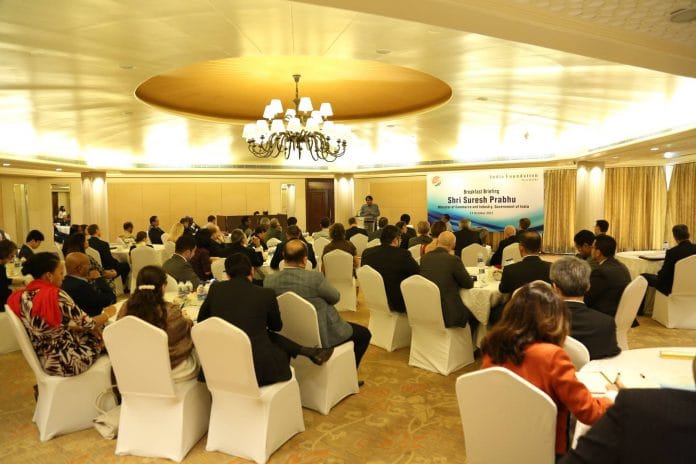The fact that ministers are honorary directors and not trustees of the India Foundation is probably deliberate — not to evade the law, but to comply with it.
A recent report on an online news portal has raised unsubstantiated allegations against India Foundation (IF), a think tank based in New Delhi. The nature of allegations pertains to legal issues, which shall be the content of this article. An issue-wise rebuttal is in order for the same.
Sponsorship
There are allegations pertaining to two events organised by the foundation; the report points out the names of the sponsors on the banners. The same banner also features names of other organisers, but the story doesn’t take note of them. It has to be understood here that an event by IF, or any other think tank for that matter, is usually organised in collaboration with other bodies, like other think tanks. Therefore, the event comes up as a different entity from the trust, which governs the foundation.
Any sponsorship for the event can’t in any way be construed to be funding for the foundation itself. Sponsorship is called “sponsorship” and not “funding” for a reason. It is specific for an event, which is not under the exclusive domain of the IF, but is a joint venture with other bodies.
For instance, the Indian Ocean Conference (IOC), which has been pointed out in the story, was a collaborative effort between IF, the Bangladesh Institute of International and Strategic Studies, and the S. Rajaratnam School of International Studies (RSIS), Singapore. The sponsorship for the IOC was for IOC only, and not for the day-to-day working of the IF.
Ministers on the board
As far as the allegations of serving ministers holding directorial posts is concerned, it has to be understood that IF is a charitable trust under Indian law. The authority and ownership of such trusts vests in the board of trustees, and not the board of directors. The same is probably misunderstood in the report.
The mere nomenclature of ‘director’ alone is not sufficient to include ancillary powers associated with it in the general sense of the term, as is the case in other situations, like under the companies law, for instance. The designation of ‘director’ here and not that of a trustee is probably deliberate, not to evade the law but to comply with it.
The Indian Trusts Act, 1882, doesn’t mention the role of ‘director’ in a trust. It is a matter of practice that in the by-laws for a trust, especially a charitable trust, the directors are made in an honorary capacity. Since IF is a charitable trust, directors are certainly honorary.
Opposition’s charges
As far as allegations by opposition parties are concerned, they are very non-serious and don’t merit a political reply. The legal position though, must be clarified.
Kapil Sibal, the senior Congress leader and former law minister, has alleged that there is a violation of Section 3 of the Foreign Contribution (Regulation) Act, 2010. The specific provision in question is Section 3(1)(e), which prohibits an office bearer of any political party from receiving foreign contributions. This allegation is made against Ram Madhav, national general secretary of the BJP.
Any student of law, even in his initial years of law school, would know the literal interpretation rule as being applicable to this provision. This provision prohibits an office bearer from receiving foreign funds in his ‘personal capacity’ and not in any other case. It can in no way be extended to apply to any body with which that person is associated.
A trust enjoys a separate legal personality from the trustees which constitute it, and directors, in any case, are very different to trustees.
The IF has clarified that it hasn’t received any foreign contribution till date, but even if it had, it would not amount to violation of Section 3 of the FCRA, because a director and an honorary director, much more, has a distinct identity from the trust he/she is director of.
There are also allegations that the FCRA licence was renewed in June 2017, but there are no returns visible by the foundation on the government website. It again has to be understood that the last renewed date on government websites could also mean the initial registration itself and not a subsequent renewal. Secondly, the mere absence of returns on the website doesn’t impute any kind of malevolent intent by itself.
The investigative nature of the story also demands that the reporter could have gone to the physical address of the office and enquired. The sole reliance on web research is very antithetical to the nature and purpose of the so-called investigative journalism.
It must be stressed here that we function under an adversarial system of justice, where as long as there is some proof of violation of law, such violation can’t be presumed in the case of absence of proof of non-violation.
The author is a research fellow with the Department of Humanities and Social Sciences, IIT, Mumbai. He is a lawyer by education, and has formerly worked for India Foundation.
Read ‘Why is code of conduct not being applied to NDA ministers on India Foundation board?’ by Shashi Tharoor.







Director of board of trustees is Semantics – Munsters must not be seen on position of responsibility on such trusts. The article is based on maybe s
and not facts. It is only suggesting why most allegations are not tenable under law. That does not acquit them of serious clash of interest.
Suppose everything that the article sayad is true then that is what IF must clarify in a statement.